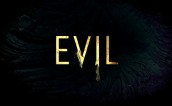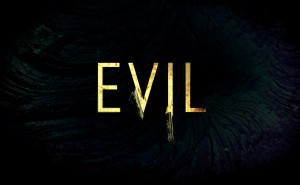In CBS’s series EVIL, now in its first season on Thursday nights and renewed for a second, faith and science both come into play in examining some very scary incidents. Katja Herbers plays forensic psychologist Dr. Kristen Bouchard, mother of four young daughters. Kristen leaves her job consulting for the court system when she is recruited by Catholic Church assessor David Acosta (Mike Colter). David is tasked with investigating whether certain situations are supernatural events or have natural, albeit complex, explanations. David believes in the supernatural; Kirsten does not. Even more skeptical is the third member of their team, technical expert Ben Shakir (Aasif Mandvi), who is able to tell when digital information has been faked.
Standing in opposition to all of them is Michael Emerson’s character, Dr. Leland Townsend, who actively enjoys encouraging malevolent acts by others.
EVIL is created by its executive producers Robert King and Michelle King, who also devised THE GOOD FIGHT, currently in its third season on CBS’s pay counterpart CBS All-Access and renewed for a fourth. The duo also created THE GOOD WIFE and BRAINDEAD.
The Kings, who are married to one another, have explained that EVIL came out of their disagreement over the nature of evil in the real world. Robert King believes the explanation can sometimes be supernatural, while Michelle King thinks it all comes down to human nature.
Robert King discusses this, THE GOOD FIGHT, and much more.
ASSIGNMENT X: Is the entire series of EVIL going to be on that knife edge of could be/couldn’t be supernatural, or is anything going to slip over one way or the other?
ROBERT KING: It’s going to slip over a lot, but here’s the thing – we’re dealing in a world that has deep fakes now, where what you see on a video, what you see in a photograph, what you hear on audio tape, is not necessarily real. You can take what I’m telling you right now and can manipulate it in a way that has me saying I assassinated Lincoln. So we’re still living in a world where the supernatural can seem to happen, or maybe is happening, but also people are manipulating it to appear so.

Cush Jumbo as Lucca Quinn; Christine Baranski as Diane Lockhart; Rose Leslie as Maia Rindell; Delroy Lindo as Adrian Boseman in THE GOOD FIGHT – Season 1 | ©2018 CBS Interactive, Inc. All Rights Reserved/Justin Stephens
AX: when you and Michelle King work together, does one of you do certain things, and the other one of you does different things, or do you both do everything?
KING: Yes. I probably take the lead on the scripts, Michelle takes the lead on the producing, and then we crisscross. She’ll take over whenever I’m doing the scripts, I’ll take over whatever she’s doing on the producing. So we don’t both sit at the typewriter. I sit at the typewriter, but then she comes in.
AX: Are you going to explore why Kristen as a character is susceptible to demonic visitations in her nightmares, and Ben is not?
KING: I think what we’re suggesting is the visitations are happening in a way that is psychological, possibly not real. This is up to the audience to decide, because there’s a little bit of a gap – how much is this something that, when you work in a job that is about dealing with the worst of mankind, is part of that haunting you? And I mean that metaphorically, as opposed to really. And then [Ben] finds himself challenged by some things he can’t explain.
AX: For instance, how does Leland knows about the demon George, who appears in Kristen’s nightmares?
KING: Right. [Leland] knows about George because he stole [Kristen’s] therapy notes, and she talked about George in therapy. But if you want to think supernaturally, he knows about George because he knows what’s going on in her head. But you don’t need to believe that, because you believe logically and scientifically he stole the therapy notes and that’s how he knows it.
AX: Although two of the leads are skeptics, and Ben comes from a Muslim family, the impetus for the investigations comes from the Catholic Church. Do you think that there is a particular relationship between Catholicism and fear of literal demons that may not be quite so literal for other religions?
KING: I think it might be. Anybody who’s gone to catechism has those demons kind of dancing around with them. We always had these books in catechism that showed the human heart as a valentine. And with every little sin, even if it was stealing chocolate or telling a lie, your heart got a little black dot. And then you would see, over the course a time, a child getting a lot of black dots on their heart, and the black dots filling the heart, and then dying, and I think a lot of us had that sense of evil, that it can be quantified and pictured in that way. And so I think we’re more likely, the Catholics, to see physical manifestations of something that is probably more ethereal. So I do think Catholics are more likely to be terrified by this. I didn’t see THE EXORCIST until I was twenty, and it was like, “Ooh, no.” It almost knocked me down. I couldn’t sleep that night, and that’s the Catholic in us. Although, let me tell you, there’s Jewish exorcism. We’re doing an episode in EVIL [with] a Muslim exorcism and a Jewish exorcism and a Christian exorcism, and it’s kind of a comparative study of how different they are, but how similar they are, too.

Katja Herbers as Kristen Bouchard and Mike Colter as David Acosta IN EVIL – SEASON 1 | ©2019 CBS /Elizabeth Fisher
AX: In the Muslim exorcism, is it a djinn?
KING: It’s a djinn. It’s kind of like a trickster. It’s not exactly the Devil – there is a word for “Devil” – I mean, there’s Satan – but it’s basically the demon that occupies you.
AX: Is anybody in your writers’ room at all superstitious about any of what you’re discussing in EVIL?
KING: Our room is. One of the writers had to leave because she was starting her own show, and she brought people an old, ancient Ouija board, she got it at an antique shop, and people have not wanted to open it. When you’re talking about this stuff all day, there’s an odd superstition that enters in that isn’t even religious. It’s kind of like, “I don’t want to touch the monkey paw. I don’t want to get near it.” That kind of thing.
AX: There are a lot of superstitions involving live theatre. Are there any superstitions involving writers’ rooms?
KING: I told you about the Ouija board. No one wants to touch it. There’s been kind of a concern about drawing demon sigils on our board. There was somebody who had a story about, they lived in an apartment and someone drew it on their wall, and the scare of that. So we kind of erase it, which is more of a superstition than anything.
AX: What is your balance of standalone versus serialization going to be in the first season of EVIL?
KING: Sixty to forty. I would say sixty to serialization. But I’m also including character development in serialization, sixty/forty. THE GOOD WIFE at the beginning was probably fifty/fifty, and then we moved to the sixty/forty. We’re trying to stick to the sixty/forty. I mean, it’s never an exact science. You’re creating a soufflé.
AX: Is CBS happy with that balance?
KING: So far, they haven’t said “boo.” When we were doing THE GOOD WIFE originally, which is almost ten years ago, they were more worried about, are we really going to do so much serialization? And then they did some testing, because they test these things in Las Vegas, and everybody was happy. “Yeah, this is the right amount.” And then they kind of didn’t worry anymore. I think they’re not worried until we go way off, which gives you a lot of freedom.
AX: Between THE GOOD FIGHT and EVIL, you’re dealing with religion and politics, which are thought of as pretty heavy topics. Are the writers’ rooms heavy?
KING: Well, here’s the thing. We jump around now from the EVIL writers’ room to the GOOD FIGHT writers’ room. THE GOOD FIGHT writers’ room is depressed. Strangely enough, the EVIL writers’ room is very light. It’s like when Sartre was writing NO EXIT – supposedly, I forgot who wrote this, but someone said, “He was the happiest man in Paris at the time.” Because he was writing about depression, and he could get it out. And yet, anybody who reads it goes, “Oh, my God, I want to kill myself.” But he was the happiest man. And I do think we’re the happiest writers’ room. Because a lot of these issues, like neo-Nazism, lone gunmen, are pressing in on our lives, and making our lives hard, and to get it out in a fictional form is not a bad thing.
AX: THE GOOD WIFE and THE GOOD FIGHT take on evil as an intellectual argument. And then in EVIL, it’s more literal. Do you see this as all being sort of the same thing?
KING: My first job was with Roger Corman. My first movie was a killer cockroach movie [1988’s THE NEST]. I think you’re always going back to your roots to find a way to make physical something that is an internal struggle.
AX: Was that with Robert Lansing?
KING: Yes! And he was doing his most serious, “Oh, my God, there’s a nest” [laughs].
AX: How are you juggling EVIL with the new season of THE GOOD FIGHT?
KING: Oh, poorly. Poorly, poorly, poorly. THE GOOD FIGHT, we backed off a month, so that we could get further ahead on EVIL, before THE GOOD FIGHT starts overlapping with it. If you see me then, I will be hanging myself, because it will be too much work.
AX: Given how good Michael Sheen was at being demonic as lawyer Roland Blum on Season 3 of THE GOOD FIGHT –
KING: Thank you –
AX: Do you think you might have him come over to be demonic on EVIL?
KING: You know what? The only reason he might not is there’s a Fox show he’s doing, PRODIGAL SON –
AX: Where he plays a serial killer –
KING: Right. And the other thing is, because he did GOOD OMENS, in which he was so good. Although he played the angel, so maybe he’d flip over and do the villain. We love him. We’d love to have him back, and so if you talk to him, tell him we want him back to play some villainous demon here.
AX: With THE GOOD FIGHT, going into Season 4, are you finding it easier or harder to find new things to talk about, because obviously, between the first three seasons, plus the seven seasons of its predecessor, THE GOOD WIFE, you’ve covered ten years’ worth of topics?
KING: I would say, on THE GOOD FIGHT front, I think it’s easier. Because we’re basing it on what’s happening right now, and what’s happening right now, as sad as it is for the world, is great for TV. You’re going to have an election coming up, you’re going to have Democrats ripping at each other. It’s it’s a very interesting time to be dealing with a political legal show. A legal show, because law is so much of what’s going on right now, both in the Supreme Court, but also in the sense that how is the law going to stop some of the bigger abuses? That’s kind of what the show THE GOOD FIGHT is about.
AX: It was left up to the viewer, but do you think that was Melania Trump in THE GOOD FIGHT episode “The One About the Celebrity Divorce”?
KING: In an earlier script, it was Melania, clearly. It was more definitive. We really pulled back, because a), it’s less interesting when it’s definitive, and b), it’s less legal [laughs]. Gina Gershon did a wonderful job [as a celebrity impersonator]. I kind of wanted to see more of that last scene. Once we saw the dailies, it was like, “Oh, I wish we did one more scene with her.”
AX: Does CBS All-Access allow you to be more political with THE GOOD FIGHT than CBS did with THE GOOD WIFE?
KING: I was surprised how political network allowed us to be, although I’ve got to tell you, how extreme we’re going on All-Access, I’m not sure if network would have followed us there. I mean, there might have been a sense, “You should pull back a little bit.”
AX: CBS ran the first season of THE GOOD FIGHT on broadcast earlier this year …
KING: I know! And we didn’t have to cut that much from it. It’s a very difficult time, because it’s such a partisan time. People define themselves not only by what they like, but what they hate. And that’s a difficult time for writers, because you don’t want people to hate you.
AX: What was cut from the broadcast version?
KING: Well, here’s the thing. I thought CBS handled it as well as they could, given how late we were in the process. And they were very kind to us when we were kind of being dickish about, “We’re going to walk away” [laughs], which, I’ve got to tell you, was the easiest thing in the world to say, because we were so tired at that point. We were just like, it’s so much easier to take a political stand. That’s probably all we should say on that front.
AX: Do you think that THE GOOD FIGHT would be as political as it is if the 2016 election had gone the other way?
KING: No, not at all. It is definitely about this moment in time, where politics seems to be culture. Because THE GOOD WIFE was more about culture than politics, but now, the two are interchangeable, which is unfortunate.
AX: Is writing THE GOOD FIGHT easier if the current administration stays in power, or easier if it doesn’t?
KING: If he’s re-elected, obviously, it’s easier, because there’s more story to tell. I won’t say our personal politics. I think it’s kind of evident. But [this political administration] has been very rich for storytelling. I’m surprised more TV shows don’t really dig into it. But I’m sure it’s not the most popular thing in the world to make statements about.
AX: You’ve managed to be very timely with your topics on THE GOOD FIGHT …
KING: That is a good thing about doing network, and even All-Access, is that the day after [it happens], you can write about something, and a month later, it can be on air. With so much of binge TV, it’s about doing all your episodes first, and editing them at the same time. So it could be twelve months between when you start it, or when you wrote it, and when you deliver.
AX: Obviously, you stay on top of the news, but do you have a secret to being so timely?
KING: I think it’s the same thing that I’m sure Vanity Fair does, or anybody who has a long lead time between when they write an article and it’s [published]. I would have guessed that Epstein would be still in the news a month-and-a-half later. I would guess that because of the richness of the material, the depth of the material. You can guess, because it’s going up in front of the Supreme Court, there are some issues about abortion coming up. You can guess that an issue regarding a movie that is up for an Academy Award, or you think will be important in March, that’s kind of what you base off of. And maybe the subject of the movie, I’m just guessing now, that will be important in March, you should play off of that. So the very first season of THE GOOD FIGHT, we were going to do an episode about THE BIRTH OF A NATION, the movie, because there were some issues with the director. We thought that would be a much bigger issue going into the Academy Awards, so we were writing an episode that was going to come out right around then. And then THE BIRTH OF A NATION didn’t do so well. And also, we felt like it was kind of mean. So we dropped it, even though it was written, and started something new.
AX: Will you delve into Epstein further?
KING: We talk about it in the writers’ room on EVIL a lot, because clearly, it is as close as you get. But also, it’s not just the main players – Epstein – but it’s also the supporting cast, the enablers. Vanity Fair did an article that seemed to touch on it, and then that was withdrawn. It’s the same thing that happened with Weinstein for years. It wasn’t just Weinstein. All these people seemed to say, “All right, he’s too powerful for us to cross, so let’s give him the benefit of the doubt.” That seems to be where the evil rests, is in the enablers.
AX: Would Reddick-Boseman defend someone like that?
KING: [laughs] Yes, definitely.
This interview was conducted during CBS’s portion of the Summer 2019 Television Critics Association (TCA) press tour.
Follow us on Twitter at ASSIGNMENT X
Like us on Facebook at ASSIGNMENT X
Article Source: Assignment X
Article: EVIL Co-Creator Robert King talks about his new CBS thriller series and THE GOOD FIGHT
Related Posts:













